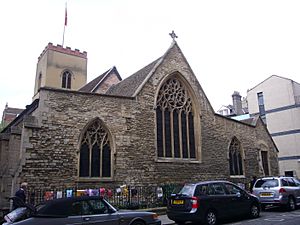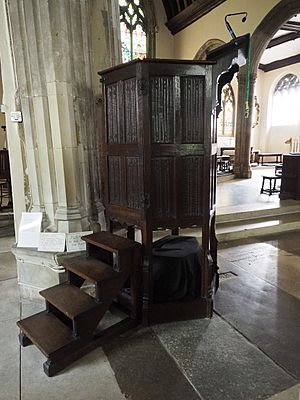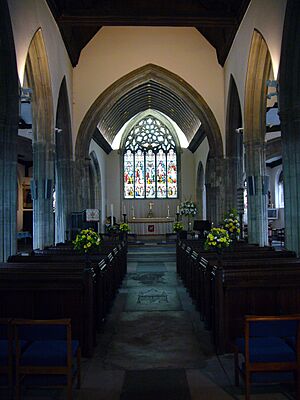St Edward King and Martyr, Cambridge facts for kids
Quick facts for kids St Edward King and Martyr, Cambridge |
|
|---|---|
 |
|
| Location | Peas Hill, Cambridge, Cambridgeshire, CB2 3PP |
| Country | England |
| Denomination | Church of England |
| History | |
| Status | Active |
| Founded | 13th century |
| Specifications | |
| Number of towers | 1 |
| Tower height | 59ft (18m) |
| Bells | 6 |
| Tenor bell weight | 8-2-22 in A (442kg) |
| Administration | |
| Diocese | None (a Royal Peculiar) |
St Edward King and Martyr is a historic church located on Peas Hill in the center of Cambridge, England. It is named after Edward the Martyr, who was King of England from 975 until his death in 978.
This church is famous because in 1525, it hosted what is thought to be the first public sermon of the English Reformation. This important event led to St Edward's sometimes being called the "Cradle of the Reformation." For a long time, it was also considered a special "royal peculiar" church, meaning it didn't belong to a specific church area called a diocese.
Contents
A Look Back: The History of St Edward's
How the Church Began
The church you see today was built in the 13th century. Experts believe it stands on the same spot where an even older Anglo-Saxon church once stood.
Around the year 1400, the church was rebuilt. This is when the main part of the church (the chancel) and the arches of the nave were created. However, the arch at the bottom of the tower is much older, dating back to the very first building.
A New Home for Colleges
When King Henry VI decided to build King's College, he needed to clear some land. This meant tearing down the church of St John Zachary, which was used by two other colleges: Trinity Hall and Clare.
To make up for this, in 1445, King Henry VI gave St Edward's Church to Trinity Hall. To this day, Trinity Hall still chooses the church's chaplain. During the 15th century, two side-chapels were added to St Edward's. The north chapel was used by Trinity Hall, and the south chapel by Clare College.
St Edward's and the Reformation
St Edward's Church played a very important part in the English Reformation. This was a time when people in England began to question and change their religious beliefs and practices.
In the 1520s, a group of people who wanted to reform the church, led by Thomas Bilney, met at St Edward's. They discussed the ideas of Martin Luther and a new translation of the New Testament by Erasmus.
On Christmas Eve in 1525, one of these reformers, Robert Barnes, gave a sermon at St Edward's. This is believed to be the first public sermon in an English church that openly supported the new ideas. He spoke about what he believed were wrong teachings in the Catholic Church.
Over the next ten years, many other important reformers preached at St Edward's. This included Hugh Latimer, who was a regular preacher there until 1531. Because of these events, St Edward's is often called the "Cradle of the Reformation."
More Recent Times
St Edward's is a bit hidden away in central Cambridge, located on the west side of the Cambridge Guildhall. It's surrounded on three sides by a pedestrian alleyway called St Edward's Passage, which has looked the same since at least the 1500s. The church has a very small churchyard.
The church is recognized as a Grade II* listed building, which means it's a very important historic building.
In the 1930s, St Edward's was a popular church for students, who affectionately called it "Teddy's."
The beautiful east window you see today was designed by George Gilbert Scott and added during renovations between 1858 and 1860. A famous theologian named F. D. Maurice served as the chaplain at St Edward's from 1870 to 1872.
Today, the acting vicar-chaplain is Reverend Dr Mark Scarlata. He also teaches about the Old Testament at St Mellitus College in London.
 | Selma Burke |
 | Pauline Powell Burns |
 | Frederick J. Brown |
 | Robert Blackburn |



